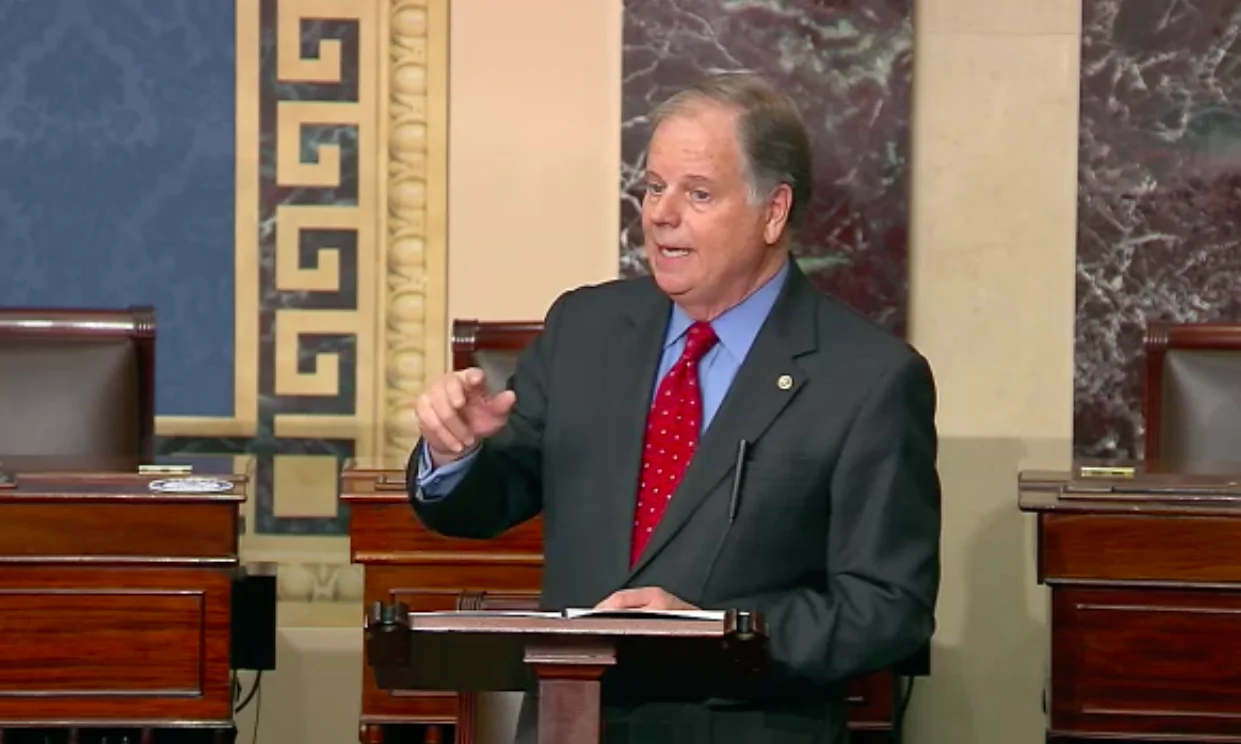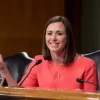Sen. Doug Jones, D-Alabama, in his final speech on the floor of the U.S. Senate, talked about what is possible through hard work and a willingness to believe, and stressed, as he’s done by example during his three years as a senator, the need to work with one another and not against.
Jones said not long after he won, he was speaking to a friend and “dreaming big about the things that we could accomplish. Make a difference in the lives of the people of Alabama and the people of America.”
“We talked about the possibility that we could work on a bill as important as the Civil Rights Act of 1964 or the Voting Rights Act of 1965,” Jones said. “But I knew, I knew though, such opportunities were not likely, especially in what I knew to be a three-year window, and not knowing what the future would hold.”
“Although, I gotta be honest. I had a pretty doggone good idea when I got here,” Jones said. “If there’s one thing my mom always taught me, it was to be realistic about things.”
Jones said he knew it would be unlikely to get the opportunity to work on such important legislation, likening doing so to the “legislative equipment equivalent of a perfect game in baseball.”
“You’re lucky if you get to be part of that in your career, but you always have to hope. You have to strive for the possible, not just the likely,” Jones said.
Jones explained that to accomplish a perfect game in baseball everyone must be working together as a team.
“As it turned out, I didn’t get a chance to be part of a perfect game,” Jones said, adding that sometimes he worries, as many of the senators on the floor do, that those perfect games can never be had in the Senate again.
He almost got that chance, Jones said, when he joined a bipartisan group of 20 other senators in 2018 who were working on immigration reform, which failed by just a handful of votes.
“For a long time, probably still to this day, when I’m asked what is your most disappointing day in the senate, I will always talk about that vote that failed so close, which was so important,” Jones said. “But what it did demonstrate is through that effort, anything is possible. You’ve got to come close sometimes before you get across the finish line.”
But Jones said not every game has to be a perfect game, and that “we did hit a home run or two, and more than our share of singles and doubles.”
“I’m really proud of the 20 plus bills that I led or co-led — bipartisan bills that have been signed into law over the last three years,” Jones said, “none would have been possible without bipartisan work.”
Jones said one of his first such early bills was the Civil Rights Cold Case Collection Act. That would never have become law without the commitment of Sen. Ted Cruz to help bring long-overdue closure to the victims of those terrible crimes, Jones said.
“None of those bills have meant more to me though than the bipartisan effort that I led with Senator Collins to eliminate the military widows’ tax that for almost two decades had deprived widows of full survivor benefits that they deserve,” Jones said.
“You know, even back in 2017, people said it was just not possible to elect a Democrat from Alabama to the U.S. Senate, and here I’ve been,” Jones said. “It’s possible to make affordable, quality health care a reality for all Americans. The ACA right now is the best hope, and the only plan that is out there.”
“As President Barack Obama himself said, and everybody should do this, if there is a better plan you can come up with, put it out there. Let’s do it. Publicly support it,” Jones said.
Jones called on the Senate to work together to provide remote access to health care for those living in rural areas during the pandemic and to provide quality education to every child and extend broadband to everyone.
“Just like the Congress did with Franklin Roosevelt and the Rural Electrification Act back in the 30s. Broadband is the new power. It’s possible to do that,” he said.
“It’s possible for law enforcement to serve and protect all Americans, not just some. To root out the systemic racism that exists within law enforcement by enlisting the support of both law enforcement and the communities. It is possible,” Jones said. “I will candidly tell you another great disappointment was when we let that moment pass this summer, hoping that with a new president, maybe a new Senate, maybe a new Congress, we could get something accomplished.”
“And I hope that that still happens, but I was disappointed we let that moment pass this summer,” Jones said, “when all of the country and all of the world was behind us, to say, please do something. Please do something that we’ve known about for decades — for centuries.”
“It’s never too late to do the right thing,” Jones said. “It’s never too late for justice.”
Jones thanked Sen. Richard Shelby, R-Alabama, for his advice and counsel, and said while he and Shelby may disagree on many policies “we’ve shared a commitment to the people of Alabama, to make sure that we do all we can to give people in Alabama the quality of life that they deserve.”
“And of course I want to thank the minority leader for all of his work, for me, on behalf of me, and as I think you guys know, not always the people of Alabama, Senator Schumer never tried to put puppet strings on me,” Jones said. “I know I got accused of that but he never, ever tried, and for that, I’m very grateful.”
“To the people of Alabama. I promised to do my best to represent each of you, whether or not you voted for me, and I’m proud of the work that we did on your behalf, that I’ve accomplished on your behalf. Thank you for giving me the honor of serving you as your senator,” Jones said.
Jones is considered a likely candidate to be nominated as U.S. attorney general by President-elect Joe Biden.











































